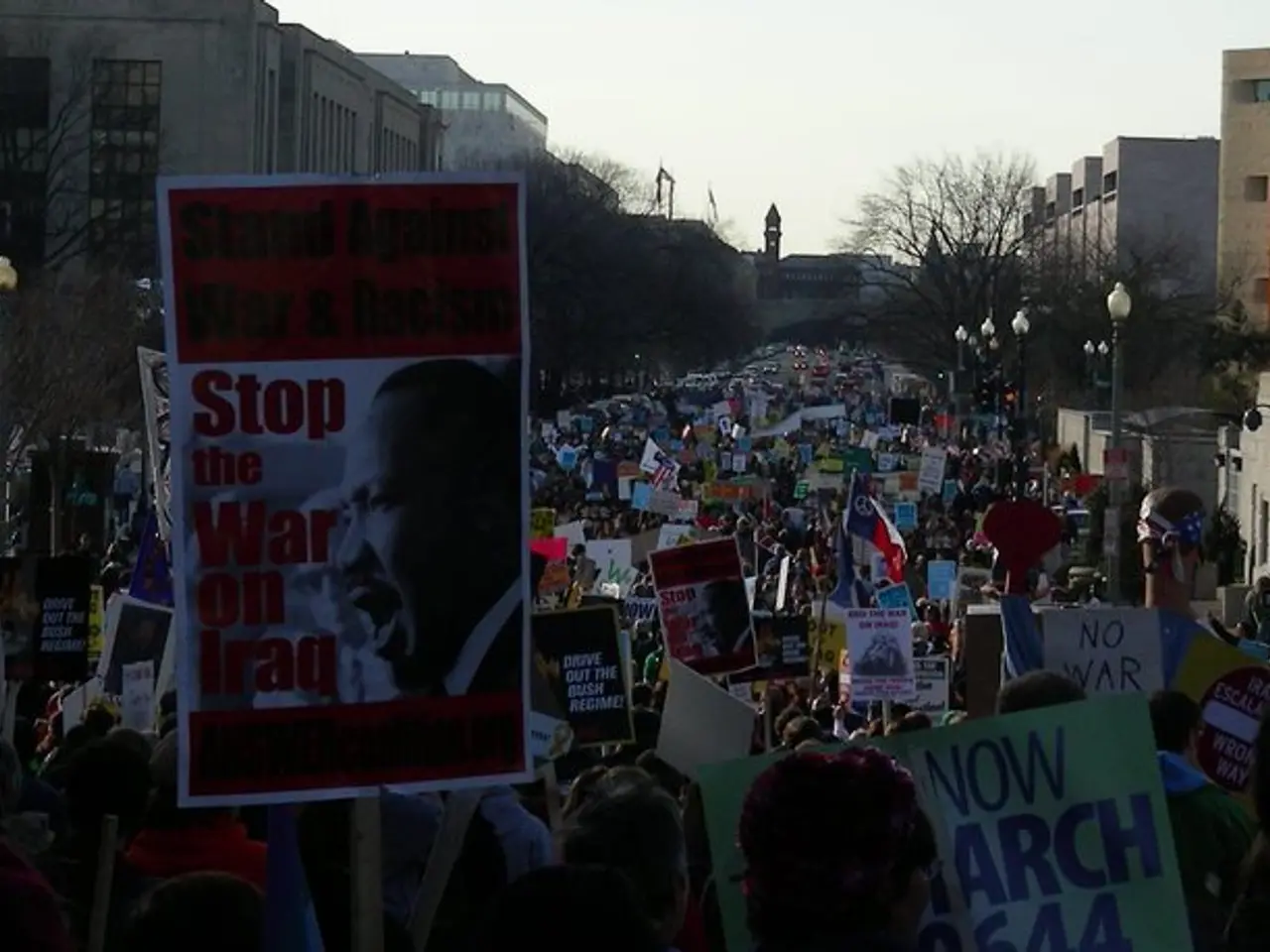Forcing Kyiv to yield territory may trigger massive Ukrainian protests, predicts analyst
In the ongoing conversation between President Trump and President Putin regarding ending the war in Ukraine, concerns about potential territorial concessions have surfaced. This issue is a sensitive one for Ukrainians, who have demonstrated their strong commitment to their country's sovereignty and democratic progress through various means, particularly through the powerful influence of their civil society.
Recent protests, such as those seen in July, have underscored this commitment. Thousands of Ukrainians took to the streets to voice their opposition to a bill that could have effectively eliminated the independence of the country's anti-corruption institutions. The government was forced to overturn the bill, a clear win for democracy in Ukraine, even during its ongoing war with Russia.
Anton Liagusha, Dean of the Graduate Department of Social Sciences and Humanities at the Kyiv School of Economics, has highlighted the role of Ukrainian civil society in political decisions, particularly those concerning territorial concessions. He stated that if Ukrainian authorities are pressured into such concessions, it could lead to mass protests.
The territories in question are occupied by Russia since its first invasion in 2014 and its all-out war in 2022. Kyiv forces do not occupy any Russian territory, so there can be no deal regarding returning Moscow its land.
The influence of Ukrainian civil society is rooted in its historic role as a defender of democracy and sovereignty, its active resistance to governmental power grabs perceived as undermining reforms, and its pivotal role in maintaining Ukraine's legitimacy and support in the eyes of its Western allies during an existential conflict.
Since the 2014 Maidan Revolution, Ukrainian civil society has been instrumental in pushing for democratic reforms and anti-corruption measures, becoming a powerful political actor. During the ongoing war with Russia, this activism intensified, with citizens viewing territorial concessions as a direct threat to Ukraine’s independence and democratic gains.
Civil society groups fiercely defend Ukraine’s key anti-corruption institutions against political encroachments by the government. Attempts by President Zelenskyy’s administration to weaken these institutions in 2025 triggered mass protests and international criticism. This vigilance reflects a broader commitment to resisting both internal corruption and external aggression, which civil society sees as inseparable.
Ukrainians have demonstrated strong democratic instincts, expressing through protests and civic activism their desire to preserve the country’s reforms and independence even in wartime. This civic engagement pressures political leaders to avoid making territorial concessions without broad public consensus and accountability.
Moreover, Ukraine’s Western allies condition much political and financial support on the country maintaining democratic standards and fighting corruption. Civil society’s activism helps keep the government aligned with these standards, reinforcing Ukraine’s negotiating position internationally and against Russia’s demands.
In light of this, if President Trump pressures Ukraine to relinquish its territory, he would need to persuade the people of Ukraine, not just President Zelenskyy. Ukrainian presidents and authorities are very sensitive to the voice of the street, having experienced three revolutions in just over 30 years.
Zelenskyy acknowledged the people's expectations for justice and the efficiency of state institutions after signing the new bill aimed at restoring the independence of the anti-corruption bodies. Whatever decisions are made with the participation of the president can be confirmed by Ukrainian society through direct street demonstrations.
Liagusha, a Ukrainian academic, has noted that Western democracies do not fully understand the role and impact of Ukrainian civil society, viewing it primarily as self-organized groups created to solve specific tactical problems. He also pointed out that Western democracies do not recognize the full extent to which Ukrainian civil society, including volunteer movements, human rights groups, and activists, have contributed to the creation of the new Ukrainian state.
This lack of understanding in Western democracies, according to Liagusha, can be attributed to the level of comfort and stability in their societies, which have historically lacked the high level of activity seen in Ukrainian civil society. As the conversation between Trump and Putin regarding ending the war in Ukraine continues, it is crucial to consider the powerful influence of Ukrainian civil society in shaping the country's political decisions.
- The powerful influence of Ukrainian civil society, demonstrated in their relentless opposition to potential territorial concessions, warrants careful consideration in the ongoing discussions between President Trump and President Putin regarding the war in Ukraine.
- In the realm of policy-and-legislation, it is essential for those shaping laws, such as President Trump, to recognize the role of Ukrainian civil society in political decisions, especially those concerning territorial concessions and sovereignty, as their voice, visible in general-news and protests, can significantly impact war-and-conflicts outcomes.








